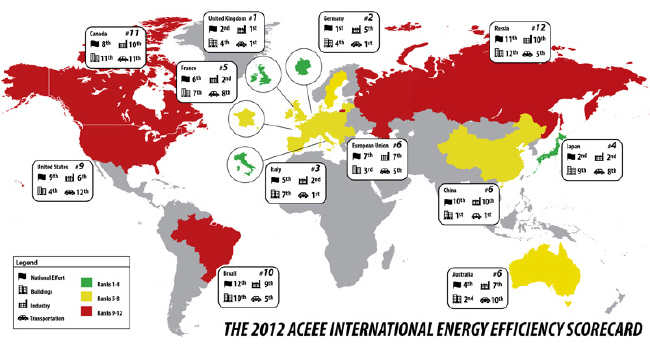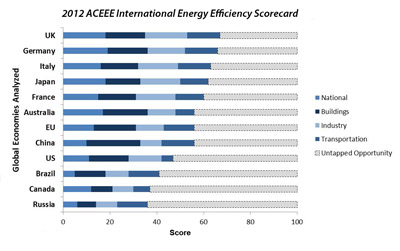The American Council for an Energy-Efficient Economy (ACEEE) has revealed details of its energy efficiency ranking of 12 of the world’s major economies. The UK has taken the top spot, followed by Germany, Italy and Japan. Meanwhile, the US took the ninth spot. It has been criticised by the non-profit ACEEE, which has issued energy efficiency recommendations for the US.
Based in Washington, DC, the non-profit ACEEE produced its first-ever International Energy Efficiency Scorecard.
The report is highly critical of the energy efficiency drive in the US over the past decade, claiming it has made “limited or little progress toward greater efficiency at the national level,” which is why ACEEE said it ranked the US ninth out of 12 economies around the globe.
Here’s a list of the energy efficiency rankings, from ACEEE:
On a scale of 100 possible points in 27 categories, the 12 economies were ranked as follows:
(1) UK
(2) Germany
(3) Italy
(4) Japan
(5) France
(6) The European Union, Australia and China (three-way tie)
(9) US
(10) Brazil
(11) Canada
(12) Russia

ACEEE said it ranked these 12 economies because they represent more than 78pc of GDP; 63pc of global energy consumption and 62pc of the global carbon-dioxide equivalent emissions.
It said it divided the 27 metrics across four groupings. These four sub-groups were those that track cross-cutting aspects of energy use at the national level, as well as the three sectors primarily responsible for energy consumption in an economically developed country, taking in buildings, industry, and transportation.
The top-scoring countries in each grouping were Germany (national efforts); China (buildings); the UK (industry); and a tie among Italy, China, Germany, and the UK (transportation).

In a statement, ACEEE executive director Steven Nadel said the UK and the leading economies of Europe are now well ahead of the US when it comes to energy that efficiency.
“This is significant because countries that use energy more efficiently require fewer resources to achieve the same goals, thus reducing costs, preserving valuable natural resources, and creating jobs,” said Nadel.
However, he said the results of the scorecard also show that no single economy is completely realising the potential for improvements in energy efficiency.
“While many countries achieved notable success, none received a perfect score in any category – proving that there is much that all countries can still learn from each other. For example, the United States scored relatively high in buildings, but was at the bottom of the list in transportation,” he said.
The British Secretary of State for Energy and Climate Change Edward Davey has welcomed the findings of the report. He said energy efficiency is at the “heart” of the UK’s policies to spur on low-carbon growth.
“Making our buildings and industries more energy efficient is a significant challenge, one that will take years to meet; doing so cost effectively will mean drawing on the experiences of others,” added Davey.
Meanwhile, for the US, the ACEE has posited the question: “How can the United States compete in a global economy if it continues to waste money and energy that other industrialised nations save and can reinvest?”
It has issued a series of energy efficiency recommendations for the US, including recommendations around combined heat and power, fuel economy for cars and heavy-duty vehicles, and efficiency in manufacturing.